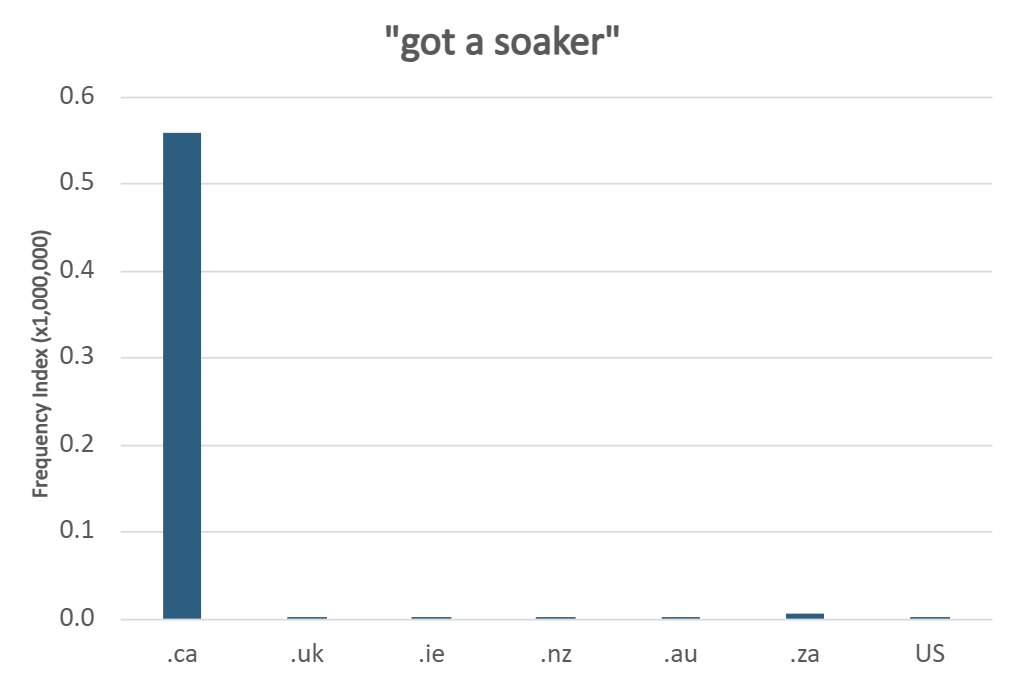Quick links
soaker
DCHP-3 (Apr 2025)
In the Prairies, booter is the more common form rather than soaker, which has a strong presence in rural and urban Ontario.
n. — Informal, especially Ontario, especially Central Canada, Prairies, Maritime Canada
a wet foot after stepping into a puddle.
Type: 3. Semantic Change — In American English slang, a soaker is usually a person who drinks excessive amounts of alcohol (Merriam-Webster Thesaurus, s.v. "soaker"). But in Canadian English soaker has had a rather different meaning relating to winter weather. The last 2025 quotation explains the events behind "getting a soaker", which is a frequent expression using the term in this sense.
The geographical distribution of the term is not fully clear at the present. Use of the term in this particular meaning extends to other provinces as well. While we have good data for Ontario from the Dialects of Ontario project (Tagliamonte 2012--), we currently lack the precise data to allow for more definite assessments, as other linguistic surveys did not poll the term.
The meaning is very frequent in Canada (see Image 1). This Canadian usage has been picked up internationally in a recent OED-3 update, s.v. "soak", which includes an "Additional sense" as "Chiefly Canadian".
The geographical distribution of the term is not fully clear at the present. Use of the term in this particular meaning extends to other provinces as well. While we have good data for Ontario from the Dialects of Ontario project (Tagliamonte 2012--), we currently lack the precise data to allow for more definite assessments, as other linguistic surveys did not poll the term.
The meaning is very frequent in Canada (see Image 1). This Canadian usage has been picked up internationally in a recent OED-3 update, s.v. "soak", which includes an "Additional sense" as "Chiefly Canadian".
See: booter
As a primarily oral term, e.g. used when someone retells the story of stepping off the curb into a concealed deep puddle, soaker in this particular sense is difficult to find, with plenty of noise, e.g. heavy rainfall, to sort through. As the first two 2025 quotations show, however, there is very solid indirect evidence for this meaning from the 1940s.
Quotations
1978
Somehow struggling through the snow with them [self-cut Christmas trees], getting soakers as the ice cracked on snow-hidden streams and getting mittens full of pine needles, blinded us to the imperfections in our pine tree.
1986
After discussing how Canadian winters vary from fog-bound coasts to the fierce storms of Ontario, Quebec and the Prairies, he sums up winter in the city as: "associated with shin-high soakers, salt-covered roads, icy-black sidewalks, wind-blasted street corners, dirty snowpiles and bleak cityscapes."
2008
When it comes to traversing a wintertime campus, you're going to need waterproof boots. May we suggest these TRETORN WELLIES, available for $79 at Get Outside (437 Queen W.)? With fur lining and an array of shiny metallics, you'll avoid the postlecture soaker.
2019
That sentence has a few made-in-Canada words, says University of Toronto linguistics professor Sali Tagliamonte, who's been on a decade-long mission to document Ontario slang.For many Ontarians, a "soaker" is what happens when someone steps in a puddle; "slimes" are the waste from a mine that fills the space where a lake once was; and a "bush party" is an outdoor party off in the woods.
2025
My mother-in-law was born around 1905 and grew up on a farm in Lavender, Ontario. She used the expression "Tell me for why."
We used "soaker" in Toronto in the 1940s.
We used "soaker" in Toronto in the 1940s.
2025
My friends and I often got soakers walking to and from school in Scarborough in the winter in the 1940s.
2025
I also got soakers, in the late 1950s -- usually when the water came in over the top of my "overboots," another Canadianism, maybe? These boots were pulled on over your shoes and fastened at the side with a clip. The top was lined with fake fur, which did absolutely nothing to add any warmth! Another part of winter clothing was the "idiot strings" that attached your mitts to the collar of your coat via the sleeves.
References
- OED-3
- Tagliamonte (2012--) • Link
- Merriam-Webster Thesaurus
Images
